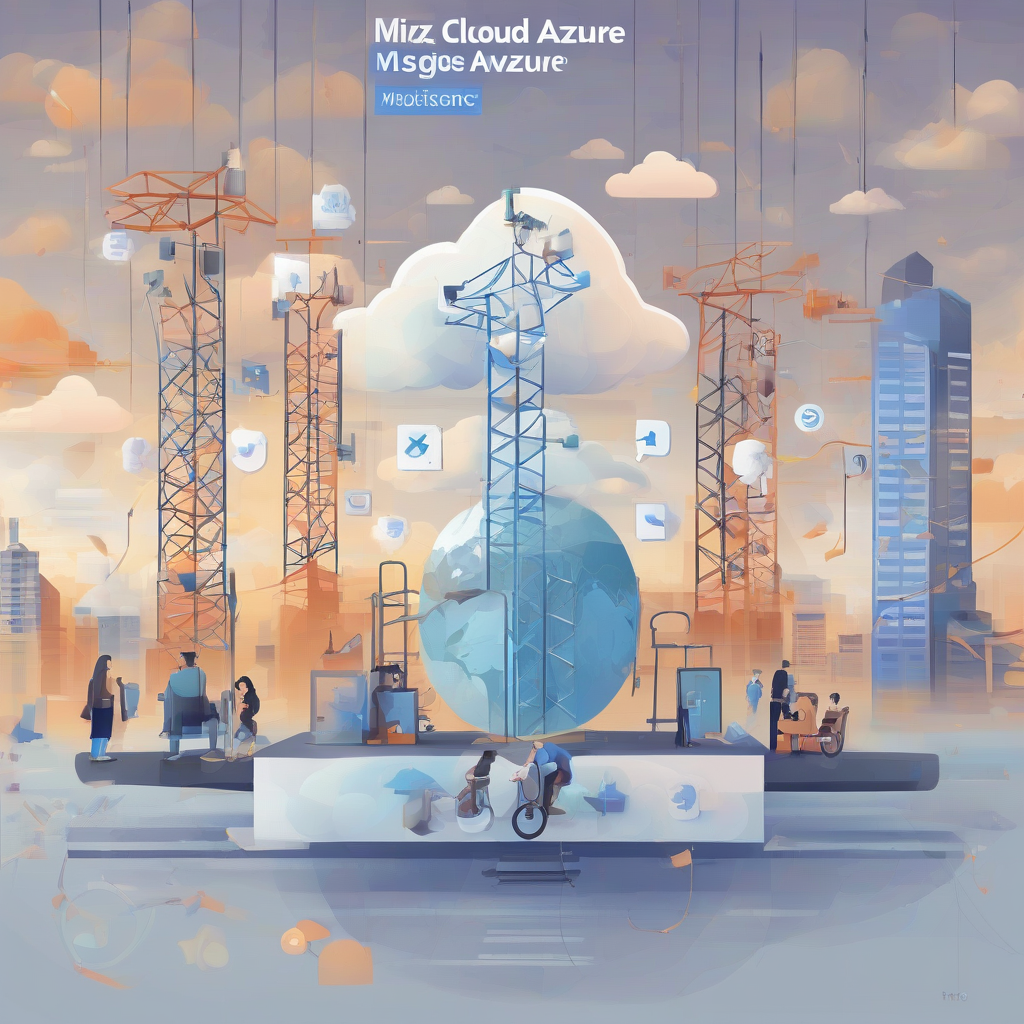Microsoft Azure vs Google Cloud vs AWS: A Comprehensive Comparison for 2023

Microsoft Azure vs Google Cloud vs AWS: A Comprehensive Comparison for 2023
In the ever-evolving landscape of cloud computing, three titans reign supreme: Microsoft Azure, Google Cloud Platform (GCP), and Amazon Web Services (AWS). Each platform boasts a comprehensive suite of services, attracting businesses of all sizes and industries. Choosing the right cloud provider can be a daunting task, as each platform caters to different needs and priorities.
This comprehensive comparison will delve into the core strengths, weaknesses, and key differentiators of Azure, GCP, and AWS, equipping you with the knowledge to make an informed decision for your organization. We will cover:
- Overview and History: A brief exploration of the origins and evolution of each cloud provider.
- Pricing Models: An in-depth analysis of pricing structures, cost considerations, and factors influencing price variations.
- Core Services and Capabilities: A detailed comparison of essential cloud services such as compute, storage, databases, networking, and security.
- Industry Focus and Expertise: A look at the specific industries each cloud provider excels in and their unique offerings.
- Ecosystem and Partnerships: An examination of the partner networks, developer communities, and third-party integrations available on each platform.
- Global Presence and Data Center Locations: A comparison of geographic reach, data center availability, and regional compliance considerations.
- Security and Compliance: An assessment of security features, certifications, and regulatory compliance frameworks offered by each provider.
- Customer Support and Documentation: An analysis of the quality and responsiveness of customer support channels and the availability of comprehensive documentation.
- Use Cases and Success Stories: Real-world examples of how businesses are leveraging Azure, GCP, and AWS to achieve their goals.
- Conclusion and Recommendations: A summary of key takeaways and recommendations based on your specific business needs and priorities.
Overview and History
Microsoft Azure
Microsoft Azure, launched in 2010, is the cloud computing platform from Microsoft. It offers a wide range of services, including compute, storage, networking, databases, analytics, and more. Azure is closely integrated with Microsoft's existing software suite, making it a natural choice for organizations already using Microsoft products like Windows Server, SQL Server, and Office 365.
Google Cloud Platform (GCP)
Google Cloud Platform (GCP), launched in 2008, is the cloud computing platform from Google. Known for its advanced data analytics capabilities, machine learning, and artificial intelligence (AI), GCP caters to organizations seeking to leverage these technologies. Google's expertise in search, mapping, and data management translates into powerful cloud services.
Amazon Web Services (AWS)
Amazon Web Services (AWS), launched in 2006, is the pioneer of cloud computing, offering a vast and mature ecosystem of services. AWS is a dominant force in the market, known for its broad range of services, global reach, and strong developer community. AWS provides solutions for almost every cloud computing need, making it a popular choice for businesses of all sizes.
Pricing Models
Azure Pricing
Azure employs a pay-as-you-go pricing model, where you only pay for the resources you consume. It offers various pricing options, including:
- Reserved Instances: Committing to a specific instance type for a fixed period, offering discounted rates.
- Spot Instances: Bidding for unused compute capacity, potentially achieving significant cost savings.
- Pay-As-You-Go: Paying for resources on an hourly or per-minute basis.
Azure offers a free tier for specific services, allowing you to experiment and test without incurring any costs.
GCP Pricing
GCP also uses a pay-as-you-go pricing model, offering flexible options for various services. Key pricing elements include:
- Committed Use Discounts: Similar to reserved instances, offering discounted rates for long-term commitments.
- Sustained Use Discounts: Offering discounts for consistent resource usage over extended periods.
- Free Tier: Providing a free tier for various services, allowing experimentation and initial development.
AWS Pricing
AWS utilizes a pay-as-you-go pricing model, with diverse pricing structures for different services. Key pricing options include:
- Reserved Instances: Providing discounted rates for upfront commitments to specific instance types.
- Spot Instances: Bidding for unused compute capacity, potentially achieving significant cost savings.
- On-Demand Instances: Paying for instances on an hourly basis, offering flexibility and scalability.
- Free Tier: Providing a free tier for specific services, allowing for experimentation and learning.
Core Services and Capabilities
Compute
All three cloud providers offer a wide range of compute services, including virtual machines (VMs), containers, serverless computing, and more. Here's a breakdown:
- Azure Virtual Machines: Offers various VM sizes and operating systems, including Windows Server and Linux. It provides features like live migration and automated scaling.
- GCP Compute Engine: Provides a scalable infrastructure for running VMs. GCP offers a variety of VM types, operating systems, and preconfigured images.
- AWS EC2: The cornerstone of AWS compute services, offering a wide selection of instance types, operating systems, and features like elastic load balancing and auto-scaling.
Storage
Cloud storage services are crucial for storing and managing data. Here's a comparison of Azure, GCP, and AWS storage offerings:
- Azure Storage: Provides various storage options, including Blob storage for unstructured data, File storage for file shares, and Disk storage for persistent volumes. Azure also offers archival storage for long-term data retention.
- GCP Storage: Offers several storage services, including Cloud Storage for object storage, Cloud SQL for relational databases, and Cloud Spanner for globally distributed databases. GCP also provides Cloud Filestore for managed file shares.
- AWS Storage: Provides a comprehensive range of storage services, including S3 for object storage, EBS for block storage attached to EC2 instances, and EFS for file storage. AWS also offers Glacier for long-term data archiving.
Databases
Databases are essential for managing and accessing structured data. Here's a comparison of database services offered by Azure, GCP, and AWS:
- Azure Databases: Offers a wide range of database services, including SQL Server, PostgreSQL, MySQL, Cosmos DB (NoSQL), and Redis Cache.
- GCP Databases: Provides a comprehensive suite of database services, including Cloud SQL for relational databases, Cloud Spanner for globally distributed databases, Cloud Firestore for NoSQL, and Cloud Bigtable for scalable data storage.
- AWS Databases: Offers a diverse set of database services, including Amazon RDS for relational databases, Amazon DynamoDB for NoSQL, Amazon Redshift for data warehousing, and Amazon ElastiCache for in-memory caching.
Networking
Networking plays a critical role in connecting cloud resources and enabling communication. Here's a comparison of networking capabilities:
- Azure Networking: Offers virtual networks (VNets), subnets, network security groups, load balancers, and VPN gateways. Azure also provides features like Azure DNS and ExpressRoute for connecting on-premises networks to Azure.
- GCP Networking: Provides virtual private clouds (VPCs), subnets, firewalls, load balancers, and VPN connections. GCP also offers features like Cloud DNS and Cloud Interconnect for dedicated connections.
- AWS Networking: Offers Virtual Private Clouds (VPCs), subnets, security groups, load balancers, and VPN connections. AWS also provides services like Route 53 for DNS, AWS Direct Connect for dedicated connections, and AWS Transit Gateway for connecting multiple VPCs.
Security
Security is paramount in cloud computing, and all three providers offer robust security features. Here's a comparison:
- Azure Security: Offers various security services, including Azure Security Center, Azure Sentinel for security information and event management (SIEM), and Azure Key Vault for managing cryptographic keys.
- GCP Security: Provides security features like Cloud Armor for DDoS protection, Cloud Security Command Center for centralized security management, and Cloud Key Management Service for key management.
- AWS Security: Offers a comprehensive suite of security services, including AWS Security Hub for centralized security monitoring, AWS GuardDuty for threat detection, and AWS KMS for key management.
Industry Focus and Expertise
Microsoft Azure
Azure has a strong focus on enterprises and businesses already heavily invested in Microsoft technologies. It excels in:
- Hybrid Cloud: Seamless integration with on-premises environments, making it ideal for organizations migrating from on-premises to the cloud.
- Windows Server and .NET Applications: Provides optimized support for Windows Server and .NET applications, making it a natural choice for Microsoft-centric organizations.
- Office 365: Offers integrated services for Office 365, simplifying collaboration and productivity tools for Microsoft users.
Google Cloud Platform (GCP)
GCP is known for its expertise in data analytics, machine learning, and artificial intelligence (AI). It caters to organizations seeking to leverage these technologies, particularly in industries like:
- Data Analytics and Machine Learning: Offers advanced data analytics tools, machine learning models, and AI services, making it ideal for data-driven organizations.
- Media and Entertainment: Provides powerful cloud services for media processing, content delivery, and streaming, making it attractive to media companies.
- Research and Development: Offers robust computing infrastructure and advanced AI capabilities, making it a popular choice for research institutions and startups.
Amazon Web Services (AWS)
AWS, with its vast range of services and global reach, caters to a wide array of industries. It's known for its:
- Broad Service Portfolio: Provides an extensive suite of services, covering almost every cloud computing need, making it suitable for businesses of all sizes and industries.
- Strong Developer Community: Boasts a large and active developer community, offering ample resources and support.
- Global Infrastructure: Has a massive global footprint, offering data centers in numerous regions, ensuring global reach and compliance.
Ecosystem and Partnerships
Azure Ecosystem
Azure boasts a comprehensive ecosystem of partners, developers, and third-party integrations. It offers:
- Microsoft Partner Network: A vast network of partners specializing in various aspects of Azure services, offering consulting, implementation, and support.
- Azure Marketplace: A marketplace for third-party software and solutions, expanding Azure's capabilities and providing ready-to-deploy applications.
- Azure SDKs and Tools: Offers a range of software development kits (SDKs) and tools for various programming languages, facilitating seamless development on Azure.
GCP Ecosystem
GCP has a growing ecosystem of partners and developers, particularly focused on data analytics and AI. It offers:
- Google Cloud Partner Advantage Program: A partner program designed to support GCP partners in building and delivering cloud solutions.
- Google Cloud Marketplace: A platform for third-party applications and solutions, extending GCP's functionality and providing pre-built solutions.
- GCP SDKs and Tools: Offers SDKs and tools for popular programming languages, facilitating development on GCP.
AWS Ecosystem
AWS has the most extensive ecosystem of partners, developers, and third-party solutions. It offers:
- AWS Partner Network: A massive partner network with a wide range of expertise, offering various services related to AWS.
- AWS Marketplace: A comprehensive marketplace for third-party software and solutions, providing a vast selection of pre-built applications and tools.
- AWS SDKs and Tools: Offers extensive SDKs and tools for various programming languages, supporting development on AWS.
Global Presence and Data Center Locations
Azure Data Center Locations
Azure has a robust global presence with data centers in numerous regions, ensuring global reach and compliance. Here are some key data center locations:
- North America: United States, Canada, Mexico
- Europe: United Kingdom, Germany, France, Ireland, Netherlands, Switzerland, Sweden, Norway, Spain, Italy, Poland
- Asia Pacific: Australia, Japan, Singapore, South Korea, Hong Kong, India, China
- Middle East: United Arab Emirates
- Africa: South Africa
GCP Data Center Locations
GCP has a growing global footprint with data centers in various regions. Key data center locations include:
- North America: United States, Canada
- Europe: United Kingdom, Belgium, Finland, Netherlands, Germany, Switzerland
- Asia Pacific: Taiwan, Singapore, Japan, Australia, India
- South America: Chile
AWS Data Center Locations
AWS boasts the most extensive global footprint, with data centers in numerous regions worldwide. Key data center locations include:
- North America: United States, Canada, Mexico
- South America: Brazil
- Europe: United Kingdom, Ireland, Germany, France, Spain, Italy, Sweden, Switzerland, Poland, Netherlands
- Asia Pacific: Australia, Japan, Singapore, South Korea, Hong Kong, India, China
- Middle East: United Arab Emirates
- Africa: South Africa
Security and Compliance
Azure Security and Compliance
Azure offers a comprehensive set of security features and compliance certifications. Key features include:
- Azure Security Center: Provides centralized security management and threat detection capabilities.
- Azure Sentinel: Offers security information and event management (SIEM) for monitoring and analyzing security events.
- Azure Key Vault: Manages cryptographic keys and secrets securely.
Azure is compliant with numerous industry standards and regulations, including:
- ISO 27001: Information security management system.
- SOC 2: Security, availability, processing integrity, confidentiality, and privacy.
- HIPAA: Health Insurance Portability and Accountability Act.
- GDPR: General Data Protection Regulation.
GCP Security and Compliance
GCP provides robust security features and compliance certifications. Key features include:
- Cloud Armor: Provides DDoS protection and web application firewall capabilities.
- Cloud Security Command Center: Offers centralized security management and threat detection.
- Cloud Key Management Service: Manages cryptographic keys securely.
GCP is compliant with various industry standards and regulations, including:
- ISO 27001: Information security management system.
- SOC 2: Security, availability, processing integrity, confidentiality, and privacy.
- PCI DSS: Payment Card Industry Data Security Standard.
- GDPR: General Data Protection Regulation.
AWS Security and Compliance
AWS offers an extensive suite of security features and compliance certifications. Key features include:
- AWS Security Hub: Provides centralized security monitoring and threat detection.
- AWS GuardDuty: Offers threat detection and security monitoring for various AWS services.
- AWS KMS: Manages cryptographic keys securely.
AWS is compliant with numerous industry standards and regulations, including:
- ISO 27001: Information security management system.
- SOC 2: Security, availability, processing integrity, confidentiality, and privacy.
- HIPAA: Health Insurance Portability and Accountability Act.
- GDPR: General Data Protection Regulation.
- PCI DSS: Payment Card Industry Data Security Standard.
Customer Support and Documentation
Azure Support
Azure offers various support options, including:
- Free Support: Provides access to online documentation, community forums, and self-service resources.
- Paid Support Plans: Offers different levels of paid support, providing phone, email, and live chat assistance.
GCP Support
GCP provides a range of support options, including:
- Free Support: Offers access to online documentation, community forums, and self-service resources.
- Paid Support Plans: Provides different levels of paid support, including phone, email, and chat support.
AWS Support
AWS offers a wide range of support options, including:
- Free Support: Provides access to comprehensive online documentation, community forums, and self-service resources.
- Paid Support Plans: Offers various levels of paid support, providing phone, email, chat, and dedicated support engineers.
Use Cases and Success Stories
Azure Use Cases
Azure is widely used by organizations across various industries, including:
- Financial Services: For secure data storage, compliance, and financial applications.
- Healthcare: For patient data management, electronic health records, and telemedicine.
- Retail: For e-commerce platforms, inventory management, and customer analytics.
GCP Use Cases
GCP is adopted by organizations leveraging data analytics, machine learning, and AI, including:
- Media and Entertainment: For content delivery, streaming, and video analytics.
- Research and Development: For scientific computing, data analysis, and AI model development.
- E-commerce: For customer personalization, fraud detection, and inventory optimization.
AWS Use Cases
AWS, with its extensive service portfolio, caters to a wide range of use cases across industries. Some notable examples include:
- E-commerce: For online marketplaces, order fulfillment, and customer service.
- Financial Services: For trading platforms, risk management, and customer relationship management.
- Healthcare: For patient data management, medical imaging, and telehealth.
Conclusion and Recommendations
Choosing the right cloud provider is a strategic decision that should align with your business goals and priorities. Each platform, Azure, GCP, and AWS, offers a unique set of strengths and weaknesses. Here are some recommendations based on your specific needs:
- Microsoft Azure: Ideal for organizations already heavily invested in Microsoft technologies, seeking a seamless hybrid cloud solution, or prioritizing Windows Server and .NET applications.
- Google Cloud Platform: Suitable for organizations focusing on data analytics, machine learning, and AI, particularly in industries like media and entertainment and research and development.
- Amazon Web Services: A strong choice for businesses seeking a broad range of services, a mature ecosystem, and global reach, catering to various industries and use cases.
Ultimately, the best cloud provider for you will depend on your specific requirements, budget, and technical expertise. It's advisable to thoroughly evaluate each platform, consider your current infrastructure, and choose the provider that best meets your needs and aligns with your future growth strategy.
What's Your Reaction?

















